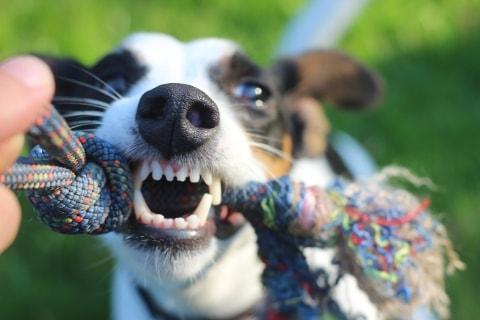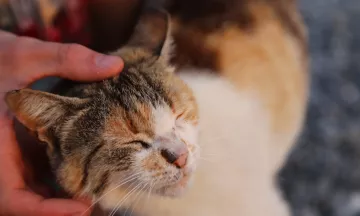Maintaining oral health and choosing the best method are part of caring for your pet. Many mouth problems can have health consequences for your cat or dog. Fortunately, there are things you can do as prevention. Do you have to brush the teeth of your pet or are there other ways?
Healthy teeth
Our pets are carnivores so your cat and dog need their teeth to handle their food. The dogs have 42 permanent teeth, and cats 30. Inflamed teeth or gums not only cause pain and discomfort but they can lead to health problems. Bacteria in the gums may enter the bloodstream and thus cause problems around the body, such as in the kidney or even in the heart. Broken teeth are usually easy to notice at home, but sometimes our fast-paced animal friends may get bangs so that dental roots can be damaged. Also, keep in mind that all dental problems may not appear on the tooth or gum surface. Gum pockets (pockets of the gum?) are an ideal place for the bacteria to grow, and there they may become wild. The mouth may also have teeth that haven't yet broken out or a piece of stick might get stuck in there from the forest trip, which, in the worst case, cause absences unless the sources of the problem is not removed in time. That’s why it is important to take good care of your pooch' teeth!
Nutrition and teeth
A healthy diet contributes to healthy teeth. As with humans, poor nutrition can cause inflammation. Conversely, certain foods can keep the teeth healthy: special, hard food can rub along the teeth during chewing which cleans the teeth. But these commercial so-called dental treats are not the whole answer. Often your dog or cat will swallow them without chewing them, which will destroy the cleaning effect. In addition, many snacks contain a high level of carbohydrates such as grains. These can increase the chance of dental plaque and tartar. Therefore, our recommendation is to provide high-quality food with a high percentage of meat and as little carbohydrate as possible.
Chewing for healthy teeth
Dogs LOVE to chew on stuff. And the good part is that prolonged chewing cleans their teeth! Choose dried meats such as bull's liver or beef skin, raw bone (from non-standing parts), or chew toys such as a rope.
Cats do not usually bite their pure food, but they rip it with their incisors (front teeth). For cats, a good diet and regular inspections are the best way to maintain oral health. However, you can try to offer melted raw chicken necks for your cat. They offer activity and help to keep the teeth in shape.

Check the teeth yourself
It is important to have your pet's teeth checked by the vet every year as part of the annual vaccination and health check. But it is also important to regularly take a look at the teeth yourself in order to detect any problems early.
It is best to get your puppy or kitten accustomed to a routine examination from an early age. But even if your pet is older, you can get him or her used to a dental check. First start by stroking your dog or cat around the head, then gently massage the mouth. Cats in particular often like this. Is your pet relaxed? Then you can gently open the mouth to check the teeth.
The gums should look firm, pink, and healthy. Pigmentation spots are common and are not a problem. Red, bleeding gums may indicate inflammation, and if it is not treated, the gums can become soft so that the teeth eventually become loose. Also, check for plaque: clean teeth are white, while dental plaque turns yellow or brown and accumulates against the edges of the teeth and molars. In particular, the obvious redness on the gum borders should be taken seriously with cats. Some cats (regardless of breed) tend to suffer from a disease called FORL. FORL damages the tooth and the enamel, which causes the core to be exposed, providing the bacteria with direct contact with the bloodstream. Illness is encountered in all ages of cats, but more commonly it is middle-aged and older cats. Symptoms can be alleviated and progression is delayed if the disease is detected in a timely manner. So if you notice something unusual about your cat's mouth, it is advisable to reserve a time to a veterinarian.
Signs of dental problems
When there's a problem in the mouth, your pet might experience pain or discomfort and eventually lose his or her appetite. Drooling or not wanting to play games with the mouth such as pulling rope can indicate dental problems. Also if a pet becomes lethargic, suddenly loses weight, or if your dog continues to howl or your cat keeps nagging, this can be an indication of mouth problems. Bad breath is another sign: a healthy dog or cat never has a smelly mouth! If you observe any of these things, go to a veterinarian to have them checked. When should I take my pet to the vet?
Is toothbrushing really necessary?
Some animals suffer from dental problems frequently while others have lifelong shiny healthy teeth without complaints. In addition to diet, the health of your pet is affected by your pet's lifestyle. Carrying or chewing stones, for example, is not good for teeth and may cause breakages. Also, the position and bite of the teeth affect the health of the teeth. If the bite does not fit together well, there is little or no mechanical cleaning and then plaque is usually more easily accumulated. If your pet tends to suffer from tooth problems, regular brushing is the best way to fight against them. You can use a soft baby toothbrush, a small towel or pet products on the market combined with pet toothpaste.
Condition your pet first on the toothbrush / cloth you are going to use and them to the toothpaste. Both dogs and cats usually let you brush the canines easily, so that may be a good place to start. Gradually you can move onto other teeth, but slowly and steadily. Remember reward and praise all the time after the action.
First let your animal get used to the toothbrush or the cleaning cloth and slowly build it up to two or three times a week. You don’t need to clean the inner side of the teeth because your pet scrapes it with their tongue which keeps it clean.
Are you a pet sitter at Pawshake and do you have experience with dental care? Stand out from the crowd and mention your special skills on your profile.







